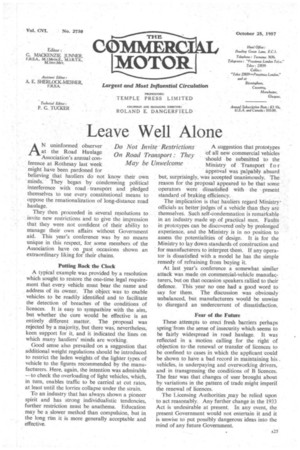Leave Well Alone
Page 27

If you've noticed an error in this article please click here to report it so we can fix it.
AN uninformed observer at the Road Haulage Association's annual conference at Rothesay last week might have been pardoned for believing that hauliers do not knoyv their own minds. They began by condemning political interference with road transport and pledged themselves to use every constitutional means to oppose the renationalization of long-distance road haulage.
They then proceeded in -several resolutions to invite new restrictions and to give the impression that they were not confident of their ability to manage their own affairs without Government aid. This year's conference was by no means unique in this respect, for some members of the Association have on ipast occasions shown extraordinary liking for their chains.
Putting Back the Clock A typical example was provided by a resolution which sought to restore the one-time legal requirement that every vehicle must bear the name and address of its owner. The object was to enable vehicles to be readily identified and to facilitate the detection of breaches of the conditions of licences. It is easy to sympathize with the aim, but whether the cure would be effective is an entirely different matter. The proposal was rejected by a majority, but there was, nevertheless, keen support for it, and it indicated the lines on which many hauliers' minds are working.
Good sense also prevailed on a suggestion that additional weight regulations should be introduced to restrict the laden weights of the lighter types of vehicle to the figures recommended by the manufacturers. Here, again, the intention was admirable —to check the overloading of light vehicles, which, in turn, enables traffic to be carried at cut rates, at least until the lorries collapse under the strain.
To an industry that has always shown a pioneer spirit and has strong individualistic tendencies, further restriction must be anathema. Education may be a slower method than compulsion, but in the long run it is more generally acceptable and effective. Do Not Invite Restrictions A suggestion that prototypes On Road Transport : They of all new commercial vehicles should be submitted to the be Unwelcome Ministry of Transport f o r approval was palpably absurd but, surprisingly, was accepted unanimously. The reason for the proposal appeared to be that some operators were dissatisfied with the present standard of braking efficiency.
The implication is that hauliers regard Ministry. officials as better judges of a vehicle than they are themselves. Such self-condemnation is remarkable in an industry made up of practical men. Faults in prototypes can be discovered only by prolonged experience, and the Ministry is in no position to assess the potentialities of design. It is for the Ministry to lay down standards of construction and for manufacturers to interpret them. If any operator is dissatisfied with a model he has the simple remedy of refraining from buying it.
At last year's conference a somewhat similar attack was made on commercial-vehicle nianufacturers, but on that occasion speakers rallied to their defence. This year no one had a good word to say for them. The discussion was obviously unbalanced, but manufacturers would be unwise to disregard an undercurrent of dissatisfaction.
Fear of the Future These attempts to erect fresh barriers perhaps spring from the sense of insecurity which seems to be fairly widespread in road haulage. It was reflected in a motion calling for the right of objection to .the renewal or transfer of licences to be confined to cases in which the applicant could be shown to have a bad record in maintaining his. vehicles, in underpaying and overworking drivers, and in transgressing the conditions of B licences. The fear was that changes of user brought about by variations in the pattern of trade might imperil the renewal of licences.
The Licensing Authorities pay be relied upon to act reasonably. Any further change in the 1933 Act is undesirable at present. In any event, the present Government would not entertain it and it is unwise to put possibly dangerous ideas into the mind of any future Government.




































































































